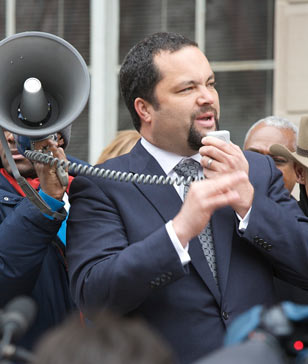Did you know that Truthout is a nonprofit and independently funded by readers like you? If you value what we do, please support our work with a donation.
Washington – With its support for gay marriage, the NAACP has done more than strike a blow for fairness and equality. The nation’s most venerable civil rights organization has made itself relevant again.
The NAACP’s 64-member board approved a resolution Saturday supporting “marriage equality” not as a matter of empathy or compassion but as a right guaranteed by the 14th Amendment. In citing this rationale, the 103-year-old organization founded by W.E.B. Du Bois firmly linked the campaign for gay rights to the epic African-American struggle for freedom and justice.
The 14th Amendment, adopted in 1868, overturned the atrocious Dred Scott ruling and guaranteed full citizenship rights to black Americans in the wake of the Civil War. The amendment’s language mandating equal protection under the law provided the basis for the Supreme Court’s 1954 Brown v. Board of Education ruling that ended segregation in public schools.
“Civil marriage is a civil right and a matter of civil law,” NAACP President Benjamin Jealous said in a statement. That’s about as clear as you can get.
Those tempted to see the NAACP’s stance as purely symbolic haven’t read the fine print. The resolution approved Saturday commits the organization to “oppose any national, state, local policy or legislative initiative that seeks to codify discrimination or hatred into the law or to remove the constitutional rights of LGBT [lesbian, gay, bisexual or transgender] citizens.”
This goes well beyond President Obama’s recent announcement that while he now supports marriage rights for gays and lesbians, he believes the granting or withholding of those rights should be left up to the states. Perhaps the evolution of the president’s view will continue.
I can’t think of anyone more likely to be disheartened by the NAACP’s bold move than the Republican strategists who thought they had found an issue that could weaken Obama’s solid and enthusiastic African-American political support.
Polls have shown that black Democrats are less supportive than white Democrats of gay marriage. With some black clergy taking an active role in the fight against marriage equality – and, from the pulpit, urging their parishioners to do the same – it looked as if Obama might be out of step with what is perhaps his most loyal constituency.
But the NAACP board, which has struggled with the issue over the years, approved the resolution supporting marriage equality by what was reported to be a nearly unanimous vote. Gay marriage is also supported by such lions of the civil rights movement as the Rev. Jesse Jackson, Rep. John Lewis, D-Ga., and former NAACP chairman Julian Bond – all of whom draw a direct line between the battle waged by black Americans in the 1960s and the battle being waged by gay Americans today.
It is possible to make this linkage while at the same time acknowledging that no two liberation struggles are exactly the same. Important distinctions — for example, the fact that only black people were enslaved — should not obscure the principle that equal protection under the law means just that.
Lewis, who still bears the scars he received while marching from Selma to Montgomery, once wrote: “I’ve heard the reasons for opposing civil marriage for same-sex couples. Cut through the distractions, and they stink of the same fear, hatred and intolerance I have known in racism and bigotry.”
In his statement, Jealous emphasized that the NAACP is talking about civil marriage, not religious marriage. The group affirmed its recognition of “the religious freedoms of all people as protected by the First Amendment.” No church should be forced to perform a same-sex marriage. But the local justice of the peace should have to view a gay couple as being no different from a heterosexual couple.
The biggest immediate impact of the NAACP’s move is to return a once-indispensable organization to center stage. The NAACP was the flagship of the civil rights movement, but in recent years – recent decades, to be honest – it seemed to lose its way. The group continued to do good work, but to the extent that it sought to identify some sort of umbrella “black agenda,” it failed as black America became increasingly diverse.
Now, under Jealous, the NAACP has waded into the civil rights battle of today — and, in the process, reclaimed some of the organization’s old prominence. I can’t remember the last time an NAACP resolution garnered so much attention around the nation and the world. I can’t wait for the next one.
Press freedom is under attack
As Trump cracks down on political speech, independent media is increasingly necessary.
Truthout produces reporting you won’t see in the mainstream: journalism from the frontlines of global conflict, interviews with grassroots movement leaders, high-quality legal analysis and more.
Our work is possible thanks to reader support. Help Truthout catalyze change and social justice — make a tax-deductible monthly or one-time donation today.
